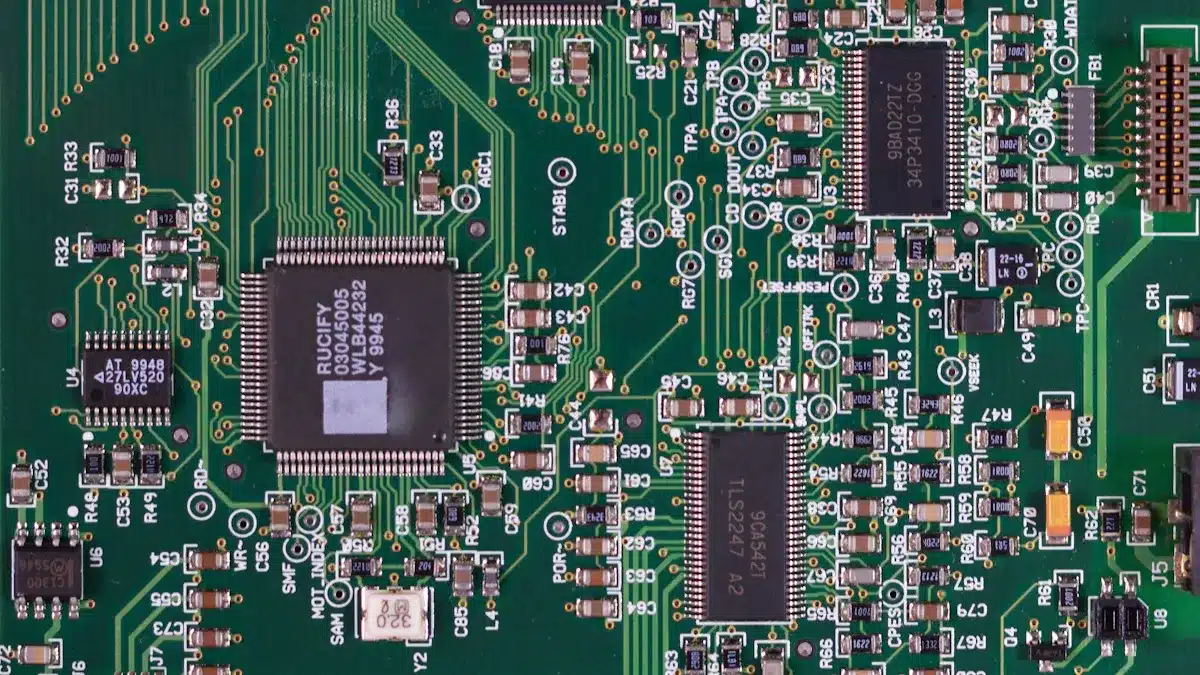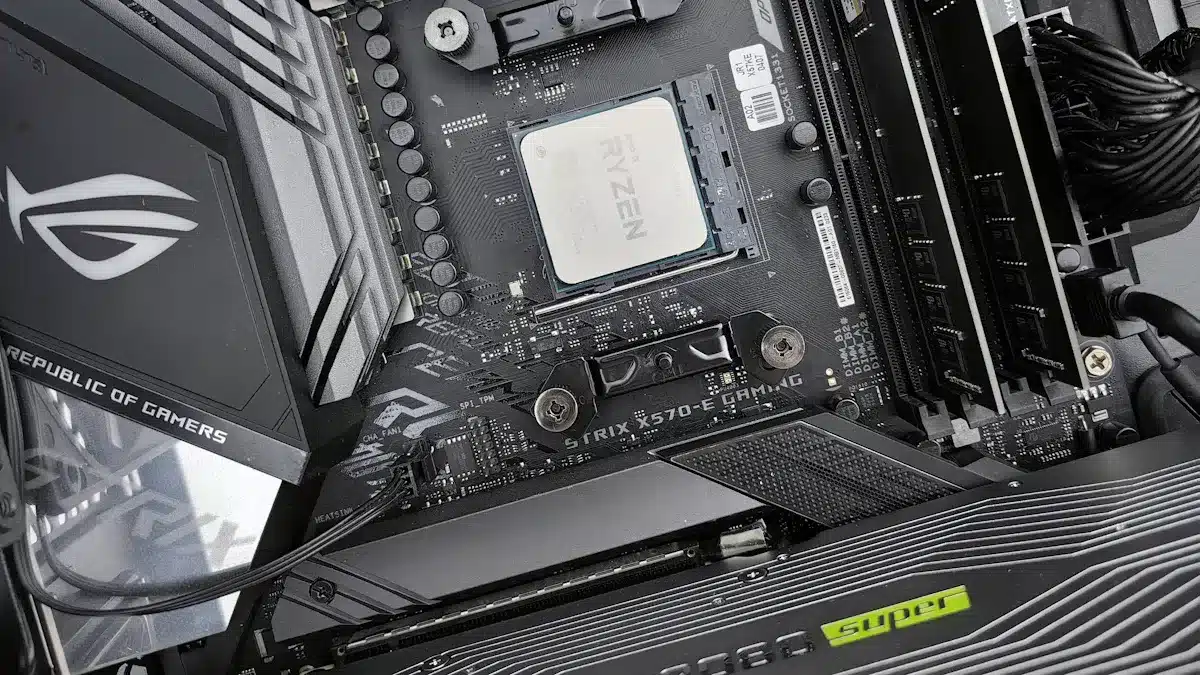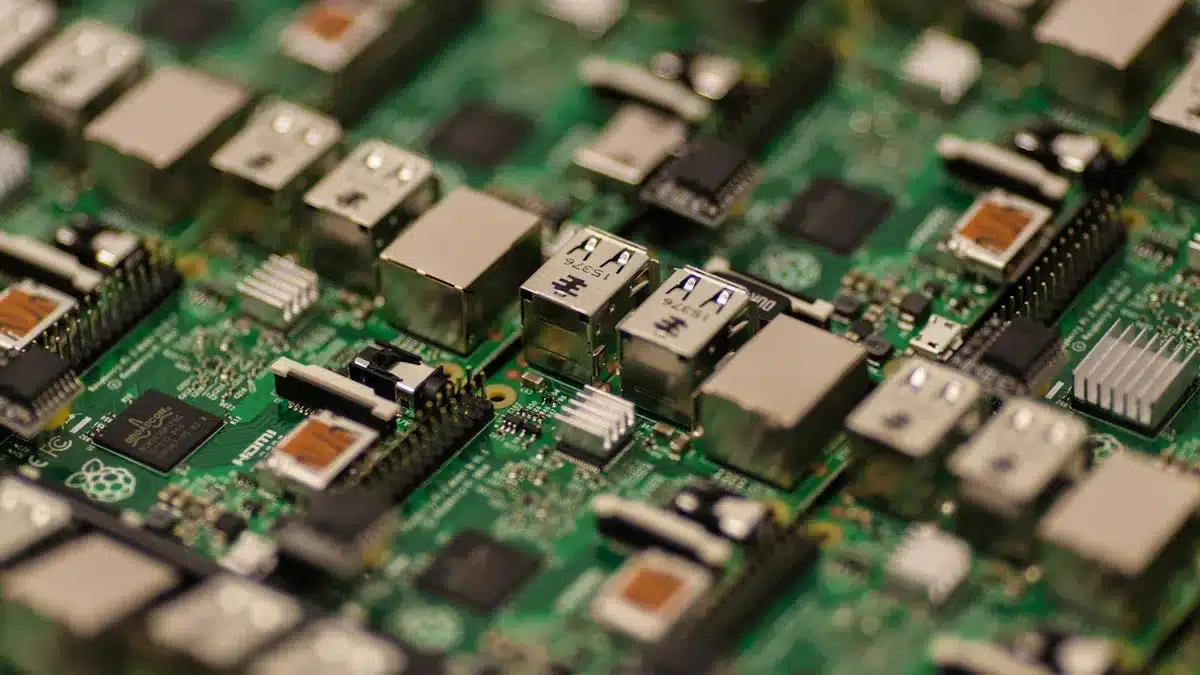
Choosing the right PCB maker is very important for your project. You need to think about many things. These include what they can do, how much they cost, how long they take, and their quality. These factors can change your production schedule and how happy you are with the results. For example, lead times can be very different between makers. Some may take 5-15 business days. Others might have faster options for simple designs. Knowing these differences helps you make a smart choice as you look at your options in circuit board makers.
Key Takeaways
Picking the right PCB maker is very important. Think about their skills, prices, delivery times, and quality to make sure your project works well.
Check PCB makers for their special skills. This includes how many layers they can make and what materials they use. These things affect how well your PCBs work.
Know how pricing works. Prices can change a lot based on how complex the design is and how many you order. Always compare prices to keep your budget.
Delivery times can change your project plan. Some makers can deliver PCBs in just 24 hours, while others might take weeks.
Quality is very important. Find manufacturers with certifications like ISO 9001 to make sure you get good products with fewer problems.
Comparison Criteria
When you look at PCB makers, some important things can help you decide. Knowing these points helps you pick the right circuit board maker for your project.
Capabilities
The abilities of a PCB maker show what they can create. Here are some common abilities you should think about:
Number of Layers: Can they do single-layer and multi-layer designs?
Materials Used: Do they have different materials like aluminum and FR4?
Solder Mask: Is there a thin layer to stop oxidation?
Surface Finish: What coatings do they offer for looks and function?
Silkscreen: Do they have a layer for identifying parts?
Fabrication Techniques: What special methods do they use for accuracy?
Testing Methods: How do they check quality with automated inspections?
Smallest Trace/Space: What is the smallest trace size they can make?
Smallest Size of Drilled Hole: How accurate are their hole sizes for parts?
Tolerances: Can they keep tight tolerances for important uses?
Board Thickness: What range do they offer in thickness based on needs?
Lead Time: What are their usual lead times for making PCBs?
These abilities affect how well your PCBs work and how reliable they are. For example, advanced methods can improve signal quality and lower electromagnetic interference (EMI), which is important for high-frequency uses.
Pricing
Pricing is another important point. The cost of PCB assembly usually goes from $0.02 to $0.05 per square inch. This price can change based on how complex the design is and what materials you choose.
Aspect | Low Volume | High Volume |
|---|---|---|
Fixed Costs | 5-10 times lower | 5-15% of total cost |
Variable Costs | Higher per unit (10-30% more) | Volume discounts (5-20% less) |
Labor Efficiency | $0.50-$2.00 per unit | $0.10-$0.50 per unit |
Knowing these pricing models helps you plan your budget well for your project.
Lead Times
Lead times can really change your project schedule. Quick-turn services can give you working PCBs in just 24 hours, while regular making might take 2 to 8 weeks based on how complex it is.
Type of PCB Order | Typical Lead Time |
|---|---|
Standard PCB | 20 working days |
Quick-Turn PCB | As little as 24 hours |
Standard Fabrication | 2 to 8 weeks |
Faster lead times often cost more because of extra labor and special shipping.
Quality Standards
Quality standards make sure that the PCBs meet industry rules. Common standards include:
Standard | Description |
|---|---|
IPC-A-600 | Rules for the visual quality and acceptability of PCBs. |
IPC-6012 | Focuses on how well PCBs perform and last. |
ISO 9001 | Sets rules for quality management systems. |
Makers with certifications like ISO 9001 usually have fewer defects, making them more reliable.
By thinking about these points, you can make a smart choice when picking a circuit board maker that fits your project needs.
Manufacturer Profiles

Aisler
Aisler is a PCB maker that is known for its quality and easy-to-use services. It is located in Aachen, Germany. Aisler focuses on making “beautiful boards” that meet high standards. Here are some of the things they offer:
Aisler works with advanced PCB technologies, such as:
HASL PCBs
TG 140 PCBs
Double Layer HDI PCBs
4 Layer HDI PCBs
They have a shared panel service. This lets multiple orders share costs. It is good for small projects.
Aisler also has a PCB stencil service. They use 100µm stainless steel for precise assembly.
Their fast turnaround time is just two days for custom PCBs. This makes them a good choice for urgent projects.
Their focus on quality and precision makes Aisler a great option for tough applications.
PCBway
PCBway is another well-known circuit board maker. They are good at many manufacturing tasks. They provide many services, making them a one-stop-shop for PCB needs. Here are some of their strengths:
Strengths | Description |
|---|---|
Quick Turnaround Times | They can deliver prototypes in as little as 12 hours. |
24/7 Customer Support | Their support teams are available all day and night. |
Customisation Options | PCBWay has many customization options, like multi-layer and flexible boards. |
Affordable Pricing | They keep prices low with no stencil fees and cheaper shipping. |
High-Quality Standards | PCBWay promises high-quality products with careful inspection and testing. |
One-Stop-Shop | They also provide CNC machining and 3D printing for complete product development. |
PCBWay’s many capabilities and customer support make them a reliable choice for small and large projects.
TTM Technologies
TTM Technologies is a leader in the PCB industry. They are known for high-quality products and new ideas. They focus on customization to meet customer needs. Here are some of their features:
Capability | Description |
|---|---|
High-Quality Products | TTM makes reliable and high-performance PCBs that meet strict industry rules. |
Customization | They provide tailored solutions for different uses. |
Innovation | TTM uses the latest technology in their products. |
Global Reach | Their worldwide presence helps customers get support easily. |
TTM Technologies has shown steady revenue growth, with a 4.4% increase each year over the last five years. Their focus on new ideas and quality helps them stand out in the PCB market.
Sanmina Corporation
Sanmina Corporation is known as a technology leader in the PCB market. They specialize in complex and multi-layer PCBs, especially for important applications. Here are some key differences:
Key Differentiator | Description |
|---|---|
Technological Leadership | Sanmina provides new solutions across many sectors. |
AS9100C Certification | This certification allows them to make high-quality PCBs for defense and aerospace uses. |
Advanced Backplane Technology | With over 30 years of experience, Sanmina improves performance for telecommunications. |
Sanmina’s skills in high-reliability areas and their focus on complete electronic systems set them apart from other North American PCB makers. Their strong engineering support and complete solutions make them great for complex electronic product development.
Top Circuit Board Makers

Advanced Circuits
Advanced Circuits is a top circuit board maker in the industry. They focus on fast service and high-quality products. Their services include:
Rapid Prototyping: You can get prototypes in just 24 hours.
Variety of Options: They have many layer counts and materials.
Customer Support: Their team gives great help during the process.
However, their prices can be higher than other makers, especially for small orders.
Summit Interconnect
Summit Interconnect is another top company in the PCB market. They are good at making high-quality, complex boards. Here are some of their main features:
Custom Solutions: They change their services to fit customer needs.
Strong Engineering Support: Their team helps with design and making problems.
Focus on Quality: Summit keeps strict quality checks.
Even with these strengths, their lead times can be longer than some other companies, which may not work for urgent projects.
Sierra Circuits
Sierra Circuits is known for its new ways of making PCBs. They do well with medium-sized production runs and focus on being efficient. Here’s what makes them special:
Year | Innovation Description | Impact on Manufacturing Processes |
|---|---|---|
1960 | Ken Bahl invented the first multilayer PCB production process. | Changed PCB design and manufacturing abilities. |
2005-2010 | They spent over $45m on new equipment and were the first to use LDI. | Improved production speed and quality. |
2011 | They launched the first web-based PCB stack-up planning tool. | Made design planning and customer interaction better. |
2015 | They introduced a full online ordering platform for PCBs. | Made ordering easier for customers. |
2016 | They received 15 patents for unique PCB making methods. | Became leaders in innovative manufacturing. |
Sierra Circuits offers fast service, making them a good choice for your PCB needs. Their focus on new ideas keeps them leading in the industry.
Customer Feedback
Positive Experiences
Many customers talk about good experiences with PCB manufacturers. They often highlight these points:
Quality of Products: Customers like high-quality boards that match their needs. Many are happy with how long their PCBs last and how well they work.
Fast Turnaround Times: Quick delivery times are impressive. Customers enjoy getting prototypes in just 24 hours, which helps them stay on track with their projects.
Responsive Customer Support: Good communication is very important. Customers appreciate manufacturers who give quick updates and help during the ordering process.
Common Complaints
Even with the good feedback, customers also share common complaints about PCB manufacturers. Here are some issues they often mention:
Complaint Type | Description |
|---|---|
Product Quality | Problems with trace and via adhesion can lead to rework risks and mistakes in manufacturing. |
Price changes between orders and surprise extra fees cause frustration. | |
Customer Service Issues | Bad handling of complaints and no accountability for mistakes make customers unhappy. |
Manufacturing Errors | Issues with placing components and missing boards in orders cause delays and extra costs. |
Customers often say they get assembled boards with defects and bad soldering quality. They also find that prices for special PCBs sometimes change after they place an order, leading to unexpected charges. Unclear communication about order problems and refunds adds to their frustration.
Knowing these experiences can help you make smart choices when picking a PCB manufacturer. By looking at both the good feedback and common complaints, you can find a manufacturer that fits your project needs and expectations.
Industry Trends
Emerging Technologies
The PCB making industry is changing quickly. You should notice these new technologies that are changing the field:
Additive Manufacturing (3D Printing): This method builds things layer by layer. It cuts down on waste and allows for complex designs.
Artificial Intelligence (AI): AI helps make production better. It looks at data, predicts machine problems, and keeps product quality steady.
Automation and Robotics: These tools help with scaling up and accuracy. They lower the need for manual work and mistakes in production.
High-Frequency Capable Materials: As 5G grows, there is more need for materials that can handle high-frequency signals.
These new ideas not only make things more efficient but also help makers meet the rising needs of modern electronics.
Sustainability Practices
Being eco-friendly is becoming important for PCB makers. You can see many practices being used to lessen environmental harm:
Lead-free materials and RoHS compliance: Makers are using lead-free materials to follow environmental rules. This lowers health risks from lead exposure.
Use of recyclable materials: The industry is focusing on recyclable materials like copper and aluminum. This helps save resources and boosts recycling chances.
Implementation of eco-friendly coatings: Methods like water-based inks and selective soldering cut down on harmful chemicals and waste.
Green standards and certifications: Certifications like ISO 14001 show that makers care about reducing environmental impacts.
Also, makers are using sustainable supply chain management and waste-cutting plans. They promote eco-friendly materials and invest in energy-saving programs. These actions not only help the planet but also attract customers who care about sustainability.
By keeping up with these trends, you can make smarter choices when picking a PCB maker that matches your values and project needs.
Picking the right PCB maker can really change how well your project does. Each maker has different skills, delivery times, and eco-friendly practices. For instance, some makers are great with new technology and fast service, while others focus on keeping costs low.
The way you gather needs and choose a vendor can really affect how buyers with special technical needs make their choices. By clearly stating your business, functional, and technical needs, you can make your selection process easier.
Think about your specific needs carefully. Use the table below to compare makers based on important points:
Criteria | Aisler | PCBway | TTM Technologies |
|---|---|---|---|
Manufacturing Capabilities | High | Medium | High |
Technology Focus | Advanced | Standard | Advanced |
Average Lead Time | 2 days | 12 hours | 2 weeks |
Market Share | 10% | 25% | 20% |
Sustainability Initiatives | Strong | Moderate | Strong |
By knowing these differences, you can make a smart choice that fits your project goals.
FAQ
What is a PCB?
A PCB, or Printed Circuit Board, is a board that connects electronic parts. It gives electrical paths and support for devices. You can find PCBs in almost every electronic device, like smartphones and computers.
How do I choose the right PCB manufacturer?
To pick the right PCB maker, think about their skills, prices, delivery times, and quality. Look at what your project needs and compare makers based on these points to find the best one.
What factors affect PCB pricing?
PCB prices depend on things like design difficulty, material choice, number of layers, and order size. More complex designs and special materials usually cost more. Always ask for quotes from different makers to get the best price.
What are lead times in PCB manufacturing?
Lead times are how long it takes for a maker to create and send your PCBs. They can change based on how complex the design is and what the maker can do. Quick services can deliver PCBs in as little as 24 hours.
Why are quality standards important in PCB manufacturing?
Quality standards make sure that PCBs meet industry rules for how well they work and how reliable they are. Following standards like IPC-A-600 and ISO 9001 helps lower defects and ensures your PCBs work correctly in their uses.
See Also
A Comprehensive Comparison of PCBWay and Competitor Manufacturers
Uncovering the Subtle Distinctions Between PCBA and PCB
Examining Functional and Structural Variations of PCBA and PCB
Understanding Essential Differences Between PCB and PCBA Manufacturing
Important Considerations for Selecting a Custom PCBA Manufacturer